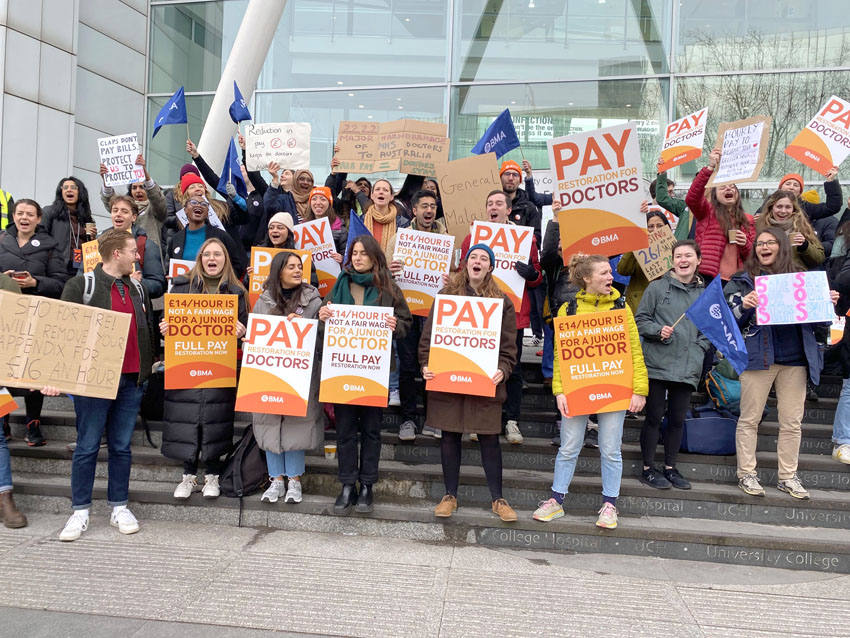TENS of thousands of junior doctors begin a four-day strike over a 26% erosion in their real-terms pay over the past 15 years, at 6.59am today, running until 6.59am on Saturday.
In the days leading up to this biggest-ever strike action by junior doctors, their BMA leaders repeatedly declared that all Tory Health Secretary Stephen Barclay had to do was ‘make a credible offer’ and they would call it off.
But Barclay ignored the offer, instead, only stepping up his verbal attacks on the junior doctors, accusing them of making ‘unrealistic’ demands.
Yesterday, fresh advertisements were put out by the BMA showing how little junior doctors are paid for their roles in surgical procedures and emphasising that they are often anything but junior in skill and expertise.
In the adverts, three doctors with ten, seven and one-years’ experience are pictured in an operating theatre where an appendix is being removed – one of thousands of similar operations that take place every day in England.
For the procedure, which lasts about an hour, they would earn £28, £24.46, and £14.09 respectively – a total of just £66.55 for a potentially life-saving procedure.
The BMA asks: ‘Is this a fair price to provide patients with high quality healthcare’?
Dr Jennifer Barclay, a surgical doctor in the North West, said: ‘There is nothing “junior” about the work I have done as a doctor. I’ll be trying to focus on steady, controlled hand movements, thinking about the next steps and communicating with the rest of the team.
‘Meanwhile, my bleep is going off incessantly in the background with more and more patients waiting to be seen as soon as I get out of theatre.
‘For that hour of work that might save a life I can be paid £19.
‘I’ll be working a busy on-call shift; treating unwell patients, assessing new patients, consenting and preparing patients for surgery and answering never-ending bleeps, when we have to run to theatre.
‘I haven’t had time to eat or nip to the loo and I know I’ll be in theatre for around an hour. An appendicectomy like the one in this advert would be a typical case.
‘I want the doctors treating my loved ones to be well rested and able to provide the best care possible.
‘I don’t want them to be burnt out, worried about paying the bills or up to £100,000 of debt or thinking about alternative careers whilst making life and death decisions.
‘My dad, an electrician, tells me to quit and retrain in his footsteps; I’d be earning more, have less stress, less responsibility, better hours and a better work-life balance after three years.
‘Surely, this life, the training, responsibility, debt and crushing workload is worth more than £19 per hour? I’ll be on the picket line this week because doctors believe that it is.’
Dr Robert Laurenson and Dr Vivek Trivedi, BMA junior doctors committee co-chairs, said: ‘It is appalling that this government feels that paying three junior doctors as little as £66.55 between them for work of this value, is justified.
‘This is highly skilled work requiring years of study and intensive training in a high-pressure environment where the job can be a matter of life and death.
‘Why then has the government allowed junior doctor pay to be cut in real terms by over a quarter in the last 15 years?
‘Why do ministers not understand that only by valuing and retaining NHS staff will the NHS be able to deliver the high quality healthcare it once could?
‘Full pay restoration is not a high price to pay for healthcare that junior doctors deliver.
‘It would see these same three doctors only being paid around £90 between them – still extremely good value for a surgical emergency.
‘That is why this week they are striking to be paid what they are worth.
‘As we have made clear in our latest offer to begin talks – we are always ready to talk and Mr Barclay can stop the strikes at any time if he proposes a credible offer.’
• See editorial and feature
